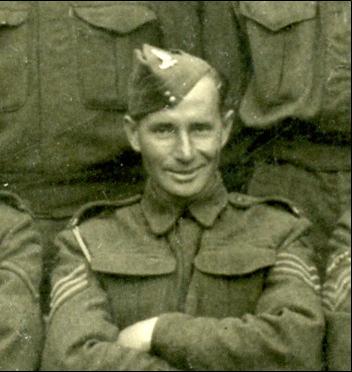THE FALL OF SINGAPORE WAS 70 YEARS AGO
144 Battery, 35 Light Anti-Aircraft Regiment, Royal Artillery
Alec Mark Blinko

Born in 1903 at Beaconsfield Buckinghamshire, Alec Mark Blinko was the third of seven children of Henry George Blinko and Amelia Edwards. His ancestry goes back through several spellings and the towns of Aylesbury and Long Crendon to the Blencowes of Bicester. In 1928 Alec married Alice Letitia West in Kent. They had sons, George (one of our members) and Gordon. Alec enlisted in 1939 joining the Royal Artillery 144/35 Light Anti-Aircraft Regiment: Service Number: 542937. He was serving as a Sergeant defending Singapore, when his regiment was overrun in February 1942. Alec was taken prisoner by the Japanese and sent to the infamous camp at Changi.
In October 1942 the Japanese decided that 600 men from the Royal Artillery units be moved from Changi to another camp in Japan. 600 POWs, many of them suffering dysentery, boarded a ship believed to be the "Masta Maru" and endured horrendous conditions. However, instead of heading for Japan they sailed South.
On 5 November the ship docked at Rabaul on the island of New Britain in Papua New Guinea where the men were unloaded and marched along dusty tracks ankle deep with volcanic ash despite many being without footwear. During this period the men were made to work in the tropical sun with many beatings. In November the prisoners were assembled and the fittest 517 were told that they were to be taken to build an airfield for the Japanese. 82 men did not to go with the party as they were deemed too unfit. The remaining 517 were taken by another hell ship to the small island of Ballale (approximately 4 miles in diameter) to build an air strip.
Ballale Island was the scene of many war crimes by the Japanese; the POWs made to work in extremely dangerous conditions building and repairing the airstrip even during Allied bombing raids. Many we killed by allied fire as the POWs had no trenches in which to take cover.
When the Japanese heard that the Allies were closing in, orders were given that the "POWs were to be disposed of by whatever means available". On 5th March, 1943, Alec Blinko and the remaining POWs were massacred in cold blood. Not one of the Ballale men survived. As a few of the islands natives had witnessed the events, the story was recorded by the Australian Forces who re-occupied the island some time later.
In 1946 the remains of only 438 of these British servicemen were recovered on Ballale and were finally interred in graves in the Bomana Commonwealth War Cemetery at Port Moresby where they are tended by the Australian War Graves Commission.
Of the original 600 POWs shipped to Rabaul, only 18 survived to return to the UK. They were from the 82 deemed too unfit to go to Ballale.
Alecs sons were ten and eleven when their father died. As they grew older, George and Gordon realized their father was not there to answer the simple questions about life. Alec had spent hours with his sons walking the woods, looking for and learning about wild life. He was a kind and gentle man who loved his family and smoked a pipe. His memory lives on through his boys.